In many African villages there are people who may have dropped out of mainstream learning due to factors that have no relationship with their natural intelligence.
Such factors include poverty leading to lack of food, shelter and fees, harsh learning environment and early or unexpected pregnancies.
Others are:
- Sickness that hinders ability to learn effectively
- Family troubles, lack of guidance and associated behavioral issues
- Inability to understand some subjects e.g. Mathematics and Sciences hence falling out with teachers
- Having non-academic talent hence regarded as a academic failure e.g being good in sports but schools are concentrating in academics
- Natural learning challenges e.g timidity leading to panic in examinations, inability to memorise or cram notes.
READ ALSO: Adults can now be awarded degrees based on their life, work experiences
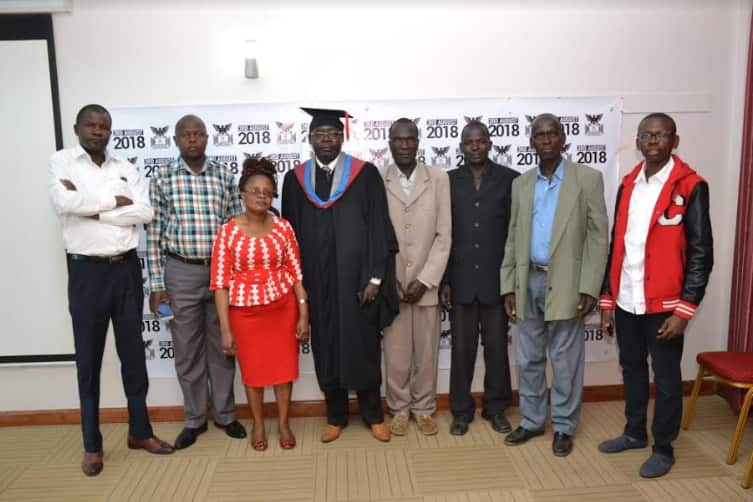
Tom Ochola (Chief Financial Admin at Regional Air – Arusha) celebrates with wife and relatives during his Masters Degree graduation based on life and work experience. Photo: GATES Education Group
Source: UGC
Frustrated by education setups, these people usually drop out of the mainstream education and begin to make a living through non-formal engagements.
They would get into mechanics, small trading, enterprise developments, innovation rubrics e.g ability to repair TVs or radios in the villages without any formal education in electronics.
Some of them emerge with amazing success. Some end up being very good business magnets, others create innovations at village level, while others become the most trusted village leaders who would eventually win elections or get appointed by government as chiefs or community level administrators.
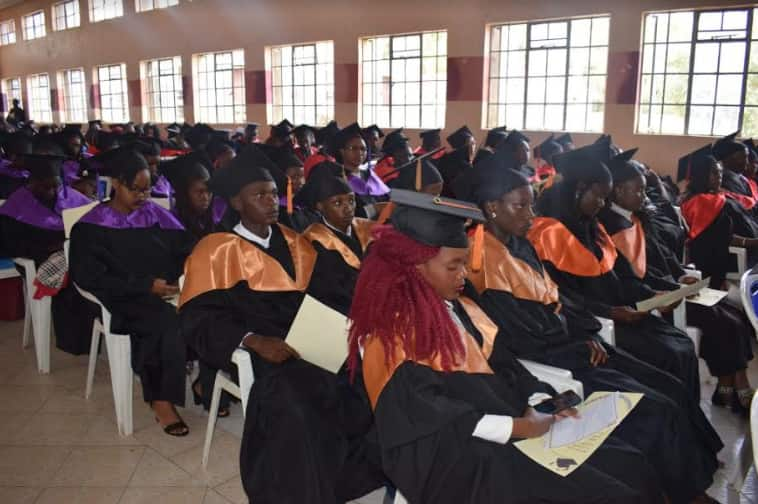
Section of Nakuru students who graduated in 2018 with degrees based on talents , work and life experience. Photo: GATES Education Group
Source: UGC
Due to the nature of their duties and level in society, these individuals may wish to access further education so that they can improve in their roles and at the same time gain respect for academic achievement.
Often they would approach established academic institutions who have set admission criteria that require passing examinations at levels they never reached.
So they usually shy away from these institutions which usually send them to “bridging programmes” where they learn with children the age of their own.
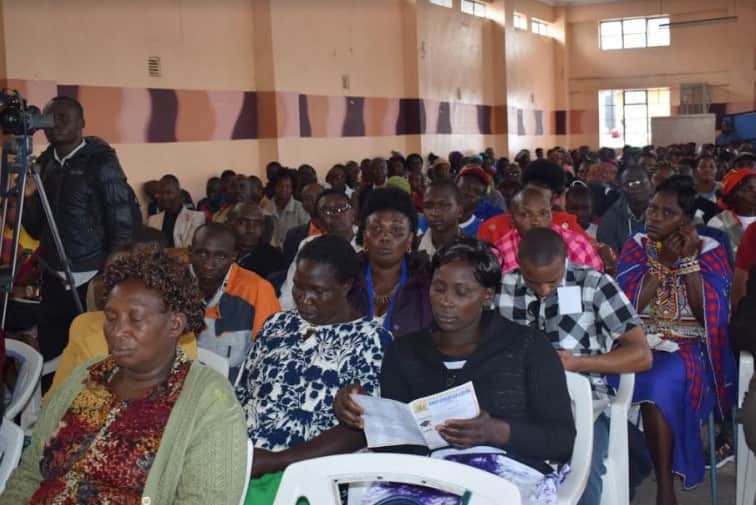
Friends and family who attended their relative’s graduation in Nakuru. They graduates were awarded degrees based on talent, work and life experience. Photo: GATES Education Group
Source: UGC
The big questions are:
- How can a person who has built a company and employs graduates be treated as an academic failure?
- But how can such a person meet the intellectual academic demand required of a university student?
- Since we know the person has knowledge (perhaps better than even a graduate), then how can this knowledge work for him or her without the usual negative energies in our education systems like having them start at very low levels and make them sit in the same class with office juniors or children the age of their own?
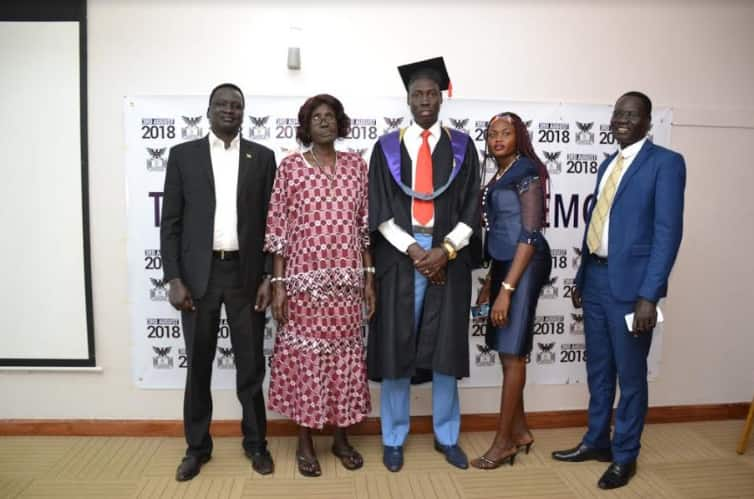
Simon Chul Bhan (PhD Graduate ) of South Sudan all smiles surrounded by friends and relatives. Photo: GATES Education Group
Source: UGC
The Matriculation Process
Matriculation is the process of finding out the ability of an adult learner and how the knowledge possessed can be used to link up with either academic or professional intellectual capacity.
There are Four Levels of Matriculation addressing the needs of the adult learners based on their current levels of education, life and work experience, which must not be less than five years.
The matriculation process consists of:
- Mature Talent Evaluation, Accreditation and Admission
- Life and Work Experience Evaluation and Accreditation and Admission
- Facilitative Learning to address skills gaps and intellectual demand
- Credit Transfer to degrees based on Expert Portfolio Recommendations
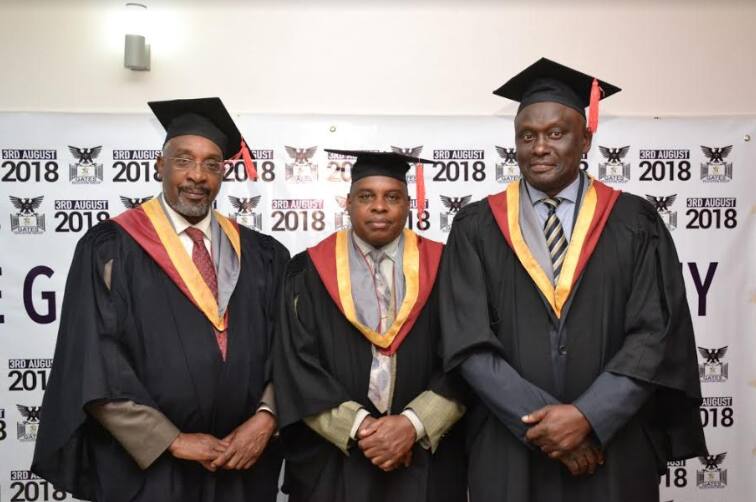
Kenya Airways captains Patrick Waweru (c) and Paul Rukaria (r) all smiles during their graduation in 2018. They graduated based on their life and work experience. Photo: GATES Education Group
Source: UGC
The process known as MATRIC uses special tools known as ‘bio-psycho-matrics’ and a select set of experts across the world who carry out the process.
For more information on bio-psycho-matrics, contact GATES Education Group.
Tel : + 254 788 193 427
+254 789 134 445
+ 254 731 202 847
E- mail: [email protected]
It is a process that undertakes ‘Mature Talent Evaluation’, ‘Credit Matriculation’, and ‘Accreditation Process’ which finally extracts ‘Credit Values’.
A report is then produced followed by a ‘Learning Prescription” that now matches usual course units in the form of Credit Points.
The prescription further indicates the right course, level, modules to be exempted, additional modules and support programmes needed to fill skills gaps and build intellectual demand (if necessary) and the universities or colleges that would accept the credits.
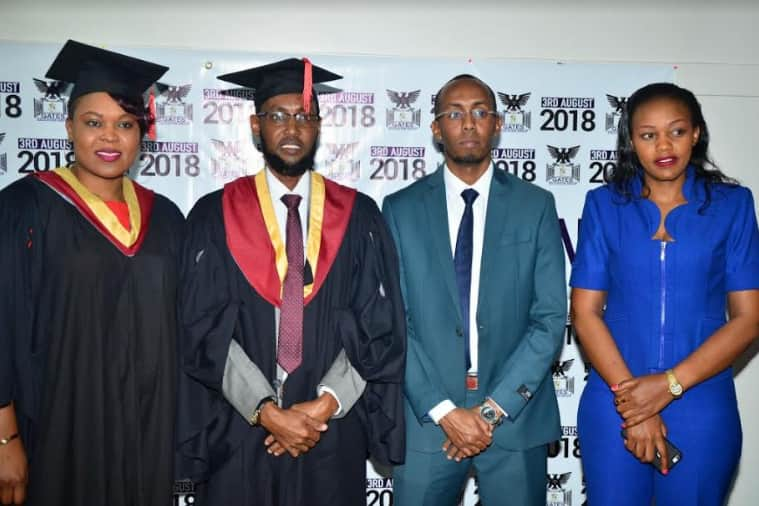
Ahmed Ibrahim Sane – Former Garsen Member of Parliament (2nd from left) graduated in Aug 2018. Photo: GATES Education Group
Source: UGC
A number of international universes are members of the council and their courses easily get assigned these credit values hence credit points.
The importance of it all is that the adult becomes eligible to join a university course without the usual grades threshold from traditional examinations.
The most important fact is that they will be allowed to join degree programs (and with exemptions!) but the learning will consist of Skills Gaps ‘Fill-Ups’ and Intellectual Capacity ‘Build-Up’.
Websites to visit for more information
2. The African Federation For the Gifted and Talented
3. The African Council for Adult Experimental Learning
{Sponsored}